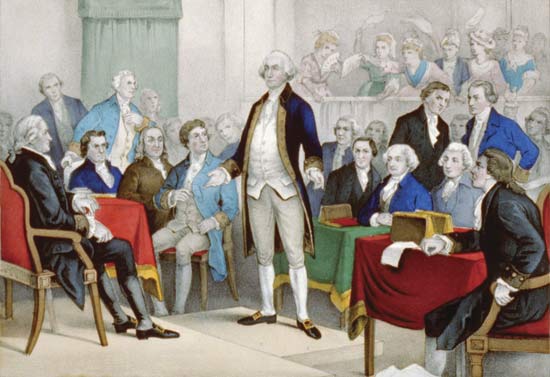The Continental Congress was the predecessor of the United States Congress. It was a convention of delegates that were sent by each of the 13 original colonies. It would be here they would debate the issue of independence. The Continental Congress would become the governing body of the United States during the American Revolutionary War.

The Congress came into being over the issues of taxation. The British had been levying taxes on the colonies in order to pay for the debt that racked up during the Seven Years' War with France. It had ignited the colonies who believed they were being unfairly taxed due to not having any representation in the British Parliament.
They began to convene in 1774 and would continue until the Constitution. It would be here where they would declare their independence from Great Britain, organize the Continental Army, and nominate George Washington to be the commander-in-chief.
First Continental Congress
The First Continental Congress gathered at Carpenter's Hall in Philadelphia from September 5 - October 26, 1774, in reaction to the British blockade at the Port of Boston. The blockade was a response to the Boston Tea Party and was viewed by most American colonists as oppression. Twelve of the 13 original colonies (Georgia had other problems that needed attention) met at Carpenter's Hall to discuss this, among other issues.
Most of the delegates at this convention were not willing to break away from Great Britain and instead wanted to try and reconcile themselves with the Mother Country. The thought of independence was faintly in the air but was not discussed at great length.
This Congress wished the King and Parliament to treat the colonial population with more equality. The colonies organized an economic boycott and seemed to be unified on most fronts but had different priorities. As stated earlier, the issue of independence was faintly in play, and it was championed by the delegates from New England.
The Middle and Southern colonies took the approach of reconciliation with Britain. They accomplished little in this Congress and decided to deliberate and convene again in May 1775 and weigh the response of King George III.
Parliament debated the merits of the colonial meeting but did not acknowledge their demands and condemned the actions of Massachusetts and the Suffolk Resolves.
Second Continental Congress
The Battles of Lexington and Concord had been fought in April 1775. The provincials had pushed the British Forces back and put the British under siege.
This would be the setting of May 10, 1775, when the Second Continental Congress convened in Philadelphia. The history books will say that the American Revolutionary War began with that shot, but in May of 1775, that issue was debatable.
John Hancock was elected President of the Assembly and supervised the debate on the floor. Many in Congress still did not want to break from Great Britain and wished to reconcile with them.
John Dickinson from Pennsylvania was the leading voice of this segment, and many would agree with him. They would adopt the Olive Branch Petition in one last attempt to avoid a full-scale war.
In June, the Battle of Bunker Hill took place when the British displayed their resolve in driving the provincials from their fortification on Breed's Hill. The British would take high casualties in taking the hill, but they could not break the siege.
This, coupled with Richard Henry Lee's passionate speech, which placed the colony of Virginia on the side of independence, swung the momentum for declaring independence.
Within a year, King George III rejected the Olive Branch Petition, George Washington was made commander-in-chief of the Continental Army, John Dickinson's influence over the Continental Congress was nonexistent, and Thomas Jefferson began drafting the Declaration of Independence.
The Articles of Confederation were put into place and acted as the colonial form of government for the duration of the war.
Confederation Congress
The Articles of Confederation became the government in place of the British Parliament, and the Continental Congress became the Confederation Congress. The Confederation Congress would guide the United States throughout the war but would endure much difficulty.
Although it was able to guide the new nation through the American Revolutionary War, it would decline in significance after the war ended. The Congress of the Confederation would end when the United States Constitution was put into place.
